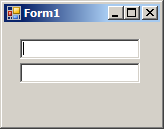
Imports System.Drawing
Imports System.Drawing.Drawing2D
Imports System.Windows.Forms
public class DisableTextBoxContextMenu
public Shared Sub Main
Application.Run(New Form1)
End Sub
End class
Public Class Form1
Private Sub Form1_Load(ByVal sender As Object, ByVal e As System.EventArgs) Handles Me.Load
Dim text_box As New NoCtxMnuTextBox
text_box.Location = New Point(TextBox1.Left, TextBox1.Top + TextBox1.Height + 4)
text_box.Size = TextBox1.Size
Me.Controls.Add(text_box)
End Sub
End Class
Public Class NoCtxMnuTextBox
Inherits System.Windows.Forms.TextBox
Protected Overrides Sub WndProc(ByRef m As System.Windows.Forms.Message)
Const WM_CONTEXTMENU As Integer = &H7B
If m.Msg <> WM_CONTEXTMENU Then
MyBase.WndProc(m)
End If
End Sub
End Class
<Global.Microsoft.VisualBasic.CompilerServices.DesignerGenerated()> _
Partial Public Class Form1
Inherits System.Windows.Forms.Form
'Form overrides dispose to clean up the component list.
<System.Diagnostics.DebuggerNonUserCode()> _
Protected Overrides Sub Dispose(ByVal disposing As Boolean)
If disposing AndAlso components IsNot Nothing Then
components.Dispose()
End If
MyBase.Dispose(disposing)
End Sub
'Required by the Windows Form Designer
Private components As System.ComponentModel.IContainer
'NOTE: The following procedure is required by the Windows Form Designer
'It can be modified using the Windows Form Designer.
'Do not modify it using the code editor.
<System.Diagnostics.DebuggerStepThrough()> _
Private Sub InitializeComponent()
Me.TextBox1 = New System.Windows.Forms.TextBox
Me.SuspendLayout()
'
'TextBox1
'
Me.TextBox1.Location = New System.Drawing.Point(16, 16)
Me.TextBox1.Name = "TextBox1"
Me.TextBox1.Size = New System.Drawing.Size(120, 20)
Me.TextBox1.TabIndex = 0
'
'Form1
'
Me.AutoScaleDimensions = New System.Drawing.SizeF(6.0!, 13.0!)
Me.AutoScaleMode = System.Windows.Forms.AutoScaleMode.Font
Me.ClientSize = New System.Drawing.Size(156, 102)
Me.Controls.Add(Me.TextBox1)
Me.Name = "Form1"
Me.Text = "Form1"
Me.ResumeLayout(False)
Me.PerformLayout()
End Sub
Friend WithEvents TextBox1 As System.Windows.Forms.TextBox
End Class